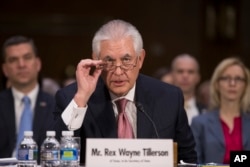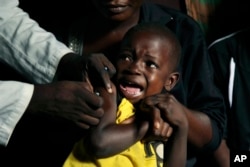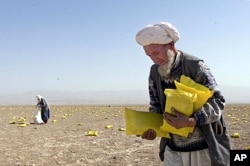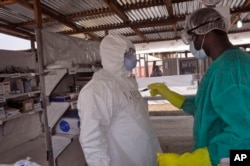The Obama administration's favorite programs to aid other countries, such as climate-change mitigation and contraception, could be in jeopardy after this week's inauguration.
What appears more certain is all overseas assistance will come under scrutiny from a president and a secretary of state with reputations in business for focusing on the bottom line.
During his confirmation hearing last week, senators quizzed secretary of state nominee Rex Tillerson about how to prevent U.S. assistance from being siphoned or stolen by corrupt regimes.
"If we're going to deliver aid into a country where we know this is a risk, what can we do in the execution of the delivery of that aid?" said Tillerson, who spent his entire career at ExxonMobil.
"Too much of the foreign aid given by the Western countries — U.S., OECD countries — has ended up only securing in power corrupt regimes," said Heritage Foundation research fellow James Roberts, a former State Department foreign service officer.
Roberts noted that in some African countries, the same leaders have been in power for decades and are sustained by international aid programs.
Africa is among the areas that the State Department transition team of U.S. President-elect Donald Trump is scrutinizing.
A four-page list of Africa-related questions from the transition staff is “alarming longtime Africa specialists who say the framing and the tone of the questions suggest an American retreat from development and humanitarian goals, while at the same time trying to push forward business opportunities across the continent," according to a report in The New York Times.
“How does U.S. business compete with other nations in Africa? Are we losing out to the Chinese?” asks one of the first questions in the unclassified document provided to the newspaper.
The new administration, Roberts said, will emphasize fighting corruption and enhancing property rights and the rule of law for dispensing foreign aid. In addition, it will look to reward countries that are going to be better allies and trade partners of the United States.
"Helping someone to help themselves. That's really the idea," Roberts told VOA.
Libertarians and many conservatives argue that foreign aid can do more harm than good, making underdeveloped countries perpetually dependent on such largesse.
But many of those involved in humanitarian work say it remains up to the United States — the world's largest aid donor — and other generous nations to avert famines, pandemics and the breakdown of social order.
Such critical donations include vaccines, antibiotics and emergency responses to epidemics and disasters.
"The market is not going to provide it if government doesn't take action," said Amanda Glassman, chief operating officer at the Center for Global Development.
For outgoing Secretary of State John Kerry, the United States needs to do even more, especially to ensure education for those at risk of being brainwashed by Muslim fundamentalists.
"I believe we need urgently a new Marshall Plan, which is focused on the most critical states in the world, in certain locations — particularly Middle East, North Africa, South Central Asia — where we have got to push back against a huge youth bulge," Kerry said in remarks January 10 at the U.S. Institute of Peace. "There are about a billion and a half children in the world under the age of 15. Somewhere upwards of 400 million of them will not go to school, and that is a problem for all of us."
Just where his presumptive successor — and Trump himself — stand on this remains largely unclear.
Trump's public comments have included "stop sending foreign aid to countries that hate us." But he has also vowed that the United States "must save humanity" and advocated the need to continue aid to such countries as Pakistan because "we don't want to see total instability."
With the White House and both houses of the Congress under Republican control, certain types of programs that are the ire of religious conservatives — a key constituency of the party — are nearly certain to face review.
"Certainly there are worries, especially in areas of family planning and reproductive health, especially in the areas of HIV-AIDS prevention and treatment," Glassman told VOA.
Tillerson's testimony before the Senate, however, "made me somewhat less worried," Glassman said, noting "he put a lot of emphasis on women's economic empowerment."
The charitable foundation of ExxonMobil, the oil company where Tillerson was chairman and chief executive officer, has made it a priority to help women become catalysts for economic development.
Team approach
With 20 U.S. government agencies involved in global humanitarian aid, the result can be quite fragmented and the agencies can, at times, overlap. That has critics looking to incorporate the U.S. Agency for International Development, or USAID, into the State Department.
"The prioritization of development assistance — foreign aid — programs could be done more efficiently with a one-diplomatic-team approach," said Roberts, of the Heritage Foundation. "Many USAID, traditional foreign aid programs have not worked. They have not been big enough to work. They don't achieve sustainable results because the way you improve people's lives is through private sector-led trade and investment."
Glassman, at the Center for Global Development, acknowledged that USAID and other government agencies need to improve their cost efficiency.
"We have a system of contractors and grantees, mainly U.S.-based,” she told VOA. “They have very high overhead costs. We need to look at how we provide assistance and make sure that the money is going as far as possible since there is so little money.”
The $34 billion the U.S. has budgeted for foreign aid in fiscal year 2017 may sound like a lot, but officials say it is a fraction of a percent of the national income.
Scandinavian countries, in terms of their share of national budgets, are the most generous. The percentage given by the United Kingdom, Germany and France also surpass that of the United States.










